Planning a trip to Germany for the first time can feel overwhelming, but with the right preparation, it can be stress-free and incredibly rewarding. Whether you’re interested in city exploration, Bavarian hiking, historic landmarks, or day trips across the country, this guide will help you organize your Germany vacation efficiently.
For more tips and inspiration, check out my Germany Adventure Blog Archive.
Booking Flights and Hotels for Your Germany Trip
To make your trip smooth, book hotels in advance to secure good prices and convenient locations. Prioritize hotels near train stations with free Wi-Fi and breakfast included. I personally recommend Booking.com for accommodation — it’s easy to compare hotel prices, view locations on interactive maps, and read verified reviews. If you sign up for a free Booking.com account, you’ll unlock Genius discounts, which can save you up to 10% or more on select stays. Many hotels also offer free cancellation, which is perfect if your plans change at the last minute.
For flights, I recommend using Google Flights or Skyscanner. Both platforms are excellent for comparing airlines, tracking price trends, and finding flexible date options. Google Flights is great for visualizing price patterns and booking directly with airlines, while Skyscanner often includes smaller or budget carriers that might not appear elsewhere. Setting up price alerts on either platform helps you catch deals before they disappear.
Tip: If your trip includes multiple cities, consider booking trains or buses in advance as well. German trains are punctual and efficient, but reserving seats for long-distance routes (like Berlin to Munich) can make your journey more comfortable and stress-free.
Organizing Your Germany Itinerary
Once flights and hotels are booked, I created a detailed travel spreadsheet with:
- Must-see castles, museums, and landmarks
- Restaurants and cafes
- Train and bus schedules
- Nearby attractions for each destination
Having this mapped out gave me confidence and made my trip more efficient. My smartphone was essential for navigation, checking train schedules, and quickly finding destinations with Google Maps. While paper maps are useful, they can be confusing in European cities, especially Berlin or Dresden.
Tip: Get an international data plan and keep your phone in airplane mode when not in use.
Transportation Tips in Germany
Germany’s public transportation is excellent. Trains and buses are punctual, clean, and safe. Some tips to make travel easier:
- Use DB Navigator app to check train times, platform numbers, and ticket prices
- Consider a Germany Rail Pass if you plan multiple cities
- For city travel, U-Bahn (subway) and S-Bahn (commuter trains) are the most efficient
- Always validate your ticket before boarding, or you may get fined
- Bikes are common in many cities—if you like cycling, consider renting one
What to Pack for a Germany Trip
Traveling light and dressing comfortably is key—especially in Southern Germany, where the weather can change quickly. I planned for hiking, museum visits, biking, and long walks, so layers were essential.
Essentials for Your Germany Trip:
- Light backpack with water bottle pocket and multiple compartments
- Travel spreadsheet and printed confirmations
- Smartphone with international data
- Neck wallet for cash, ID, and passport copies
- Durable luggage
- Layered clothing for variable weather
- Rain jacket and small umbrella
- Hat and sunglasses
- Reusable water bottle (tap water is safe and delicious in Germany)
- Snacks, small first-aid kit, travel-size toiletries
- Travel chargers and plug adapters
- Optional: earplugs, travel clock, hangers, medications
Pro Tip: Keep your most important items—passport, medication, travel documents, electronics, and a change of clothes—in your carry-on bag.
Budgeting Tips for Your Germany Trip
Germany is relatively affordable, but planning ahead can save money:
- Book hotels and flights early to get the best rates
- Look for city tourist cards (like the Munich CityPass) for discounted museum entries and public transport
- Many restaurants offer lunch specials that are cheaper than dinner menus
- Use supermarkets (Rewe, Aldi, Lidl) for snacks and drinks to save money
- Tap water is free in most restaurants if you ask for it
Cultural Tips
- Germans are punctual—always arrive on time for tours and train departures
- Tipping: usually 5–10% in restaurants
- Learn a few basic phrases in German: Danke (thank you), Bitte (please/you’re welcome), Entschuldigung (excuse me)
- Most stores close on Sundays, so plan shopping trips accordingly
Suggested Destinations and Day Trips
Germany has so much to explore, from historic cities to scenic towns. Some destinations I recommend include:
- Munich and the Bavarian Alps (Mittenwald for hiking)
- Salzburg, Austria for a short international trip
- Berchtesgaden for stunning Alpine scenery
- Nuremberg for historic architecture and museums
- Berlin, Germany’s vibrant capital, full of history, culture, and nightlife
- If you decide to visit Berlin, it’s worth taking a day trip to Dresden, a beautiful city with baroque architecture and rich history
- Other great cities to consider: Rothenburg, Heidelberg, and Bamberg for classic German charm
You can explore more detailed travel blogs here:
Festivals and Seasonal Highlights
If your travel dates are flexible, consider timing your trip around some of Germany’s famous festivals:
- Oktoberfest (Munich, late September–early October)
- Christmas markets (late November–December)
- Karneval (Cologne, February)
- Summer festivals in Berlin and Dresden
Planning around these can make your trip even more memorable.
Final Thoughts
Germany is ideal for first-time travelers because of its efficient public transportation, safe cities, and abundance of tourist-friendly services. By planning ahead, booking smartly, packing wisely, and knowing some cultural tips, your Germany trip can be stress-free and unforgettable.

